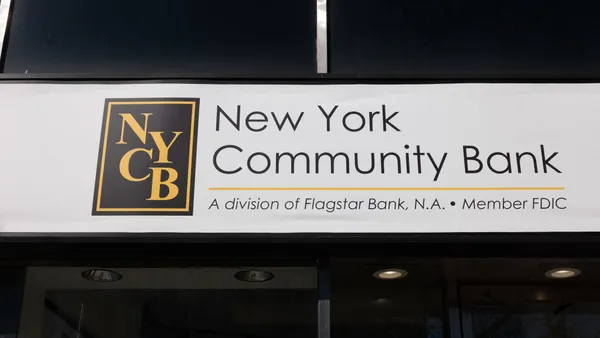Dive Brief:
- Zions Bancorporation CEO Harris Simmons suggested this week the Salt Lake City-based company is scanning for acquisition opportunities, with bank consolidation set to continue.
- In the community bank space, concerns related to artificial intelligence, stablecoins and tokenized deposits may accelerate the pace of consolidation, Simmons said Wednesday at a Barclays investor conference, potentially creating “a lot of interesting opportunities” for acquirers.
- “My hope is that we’ll actually be quite good at being able to do that,” said the CEO of the $89 billion-asset bank. Such purchases won’t be as interesting to the largest banks, Simmons said. “We’re a really good partner for some of these smaller ones that still probably are going to be looking for a home.”
Dive Insight:
Reigniting bank M&A speculation this week was PNC’s proposed purchase of Colorado’s FirstBank for $4.1 billion, announced Monday.
Akin to what Simmons noted, PNC CEO Bill Demchak said the Pittsburgh-based super-regional doesn’t have much interest in a typical smaller bank, “in terms of where they’re valued today.” But the $559 billion-asset lender “effectively bought Colorado” with the acquisition of privately held FirstBank, Demchak said.
PNC’s acquisition and Huntington’s pending purchase of Texas lender Veritex, announced in July, are likely to be the first in a wave of acquisitions by Category III and IV regional banks, which have assets between $100 billion and $700 billion, according to a Moody’s note Thursday.
The firm noted the shift in regulatory sentiment toward M&A, lower short-term interest rates, a steepening yield curve and strong asset performance teeing up more deals, on top of the long-term trend of consolidation.
“Given the continued fragmentation of the banking sector, institutions are increasingly pursuing scale to achieve greater diversification, build more competitive franchises, and improve operating efficiency — particularly in light of the rising technology investments required to remain competitive,” Moody’s said.
With that landscape and PNC’s deal announcement, M&A came up repeatedly at the Barclays conference. M&T CFO Daryl Bible, for example, indicated it’s a matter of when, not if, the Buffalo, New York-based regional does another acquisition, which would likely be within its current footprint, to increase density in the markets the $210 billion-asset bank already serves.
“There were a number of regional banks that expressed what seems like newfound openness to doing deals as buyers, to the extent they make sense from a geographic or product/capability perspective,” Truist Securities analyst John McDonald wrote in a Friday note.
Still, there are more buyers than sellers in the market, bank executives and analysts have noted. “People you think might be sellers are actually buyers,” Demchak said Tuesday.
To Zions’ Simmons, economies of scale tend to be found at the branch level, or with specific lines of business.
“If you can find a deal where you can have in-market consolidation and create larger average branch sizes, then absolutely, that’s useful, in terms of creating more productivity,” he said. Or there might be areas where added product lines can offer operating leverage.
“What I don’t believe is that getting incrementally larger is always the solution to problems,” Simmons said.
He likened industry efforts to chase scale to racing dogs pursuing mechanical rabbits, with bank executives telling themselves, “if I just get larger, everything’s going to be OK.”
There are well-run small banks that create a lot of value, Simmons contended, just as there are large banks that don’t.
Simmons emphasized that he’s not averse to doing deals, “but it’s not an automatic solution to anything.” He also stressed that he’s uninterested in a merger with a similarly sized bank, as the situation becomes more complicated when you don’t know who the buyer is.
“The larger the deal, the more you find that you’re trying to adapt two cultures into a third culture that nobody’s ever seen before,” he said.
After a potential merger of equals with Utah’s First Security fell through in 2000, Simmons said he made a commitment: “You’ll never see another MOE from me.”












